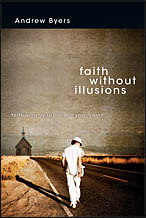 Andrew Byers has published a really good book Faith Without Illusions: Following Jesus as a Cynic-Saint. This book is one that I resonated with. I must confess I am a Christian cynic, hopefully becoming what Andrew labels a “Cynic-saint”. What is a Christian cynic you ask?
Andrew Byers has published a really good book Faith Without Illusions: Following Jesus as a Cynic-Saint. This book is one that I resonated with. I must confess I am a Christian cynic, hopefully becoming what Andrew labels a “Cynic-saint”. What is a Christian cynic you ask?
Andrew defines a Christian cynic as one who through painful disillusionment comes to embrace reality with an embittered spirit. Its a sickness.
But cynicism is the “new spirituality”.
So many believers have now slid into those dark pits that cynicism is becoming vogue in many Christian circles as a self-identifying trademark of a new spirituality – edgy spirituality of the jaded. Since cynicism is emerging as a hop new way to be “spiritual,” religious disenchantment is often hailed as a spiritual virtue (8).
How do you know if you’re a Christian cynic? Andrew provides a brief description:
They would never be caught in public wearing the ridiculous T-shirt they got at the legalistic dating conference from earlier days in the youth group. Christian cynics would be humiliated if anyone found the old “What Would Jesus Do? ” bracelet buried in their desk drawer. They would listen to the Christian pop music radio station only for laughs. They would try to avoid displaying too much emotion during a worship service or answers correctly too many questions at the Bible study, lest they suffer from the dreaded accusation of being “hyperspiritual”. On a graver note, Christian cynics sometimes delight in watching fellow believers tread on life’s land mines, and their flaunted skepticism can even become the means by which the faithful forsake their faith (8-9).
My wife Karla and I have had a bad case of cynicism especially during our years in Cambridge while I was doing my doctoral work. I remember coming back to the US with a chip on my shoulder. I hated the suburbs for starters. And I thought the evangelical church in America was so stupid. I remember having trouble worshiping in my mega-church with all the SUV’s in the parking lot, the expensive building and the slick promotional material. I had to repent of that hard, cynical heart.
Cynicism needs to be healed because it is a destructive disposition. It isolates a person from Jesus and his church. What cynics need, according to Andrew, is a very large dose of hopeful realism. A realism that recognizes its position “between the trees” – to use a Rob Bell image from one of the Nooma videos (I know it is not good to refer to Rob anymore if you are an orthodox Christian – he did have some good things to say!) – the position between the old and new creation. “We need to foster a biblical spirituality that embraces the grim reality of our ex-Eden life along with the joyful reality that God is making all things new” (12).
But, cynicism is also beneficial if used constructively says Andrew. And I’m glad he did! The book argues, rightly I think, that the future health of the evangelical church is dependent on transforming cynics from deconstructive influences to constructive. This is the most important assertion of the book.
The people that have the most to offer the church in directing it into its future are those that because of cynicism want nothing to do with it.
The problem of “pop-Christianity”, the oversimplified theology and the trite sentimentality that is so rife throughout the Western Church, is evangelism’s greatest danger and it needs to be confronted. It is this task that cynics are in such a good position to tackle. The reason, Andrew points out, is because “disillusionment is illumination”. The moments of painful discovery are revelatory experiences from which others can benefit (11).
Those prone to cynicism possess insight that the church, sick with populist misconceptions and ridiculous practices, desperately needs. Their voices will only be helpful, though, if . . . their wounds can be restored to health. We are in dire need for redeemed cynics to dress their wounds that they may rise up and flourish in the truths revealed to them for the health of the church and for the glory of God (12).
I can’t couldn’t agree more with Andrew.
Faith Without Illusions is divided into two parts. Part One addresses the elements of contemporary pop Christianity that make folks cynical. Andrew deals with Idealism, Religiosity, Experimentalism, Anti-intellectualism, and Cultural irrelevance.
Part Two presents alternative biblical paradigms of productive approaches that rehabilitated cynics can take in constructively influencing the church, proper means of promoting renewal and reform. These examples are prophetic, sapential (wisdom), poetic, and sacrificial.
I think this is an important book for the renewal and reformation of the church. The future of the church is at stake in the ministry to Christian cynics. Most of whom, by the way, are in the Emerging adult life stage. The church has got to crack the nut of ministry to the 18-3o year old. Faith Without Illusions will assist us in thinking about how to do it.











